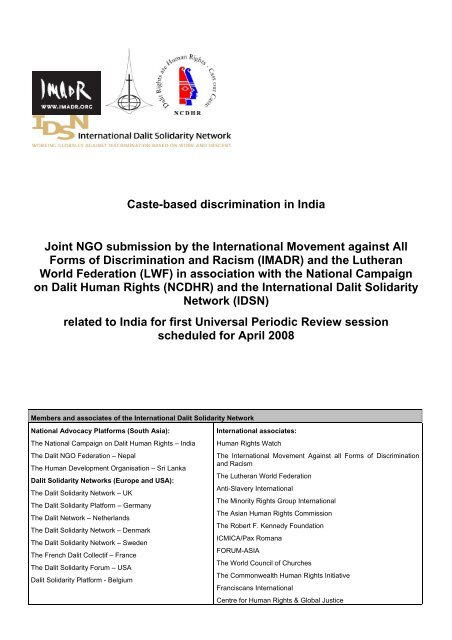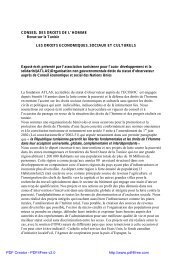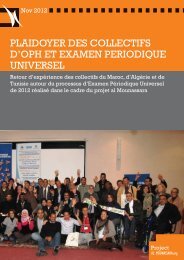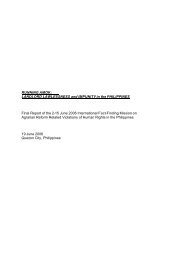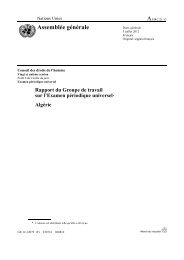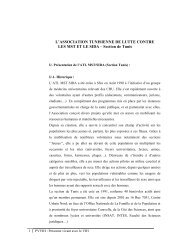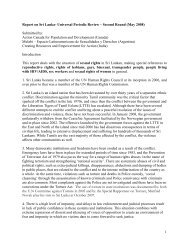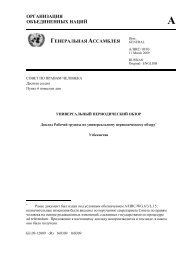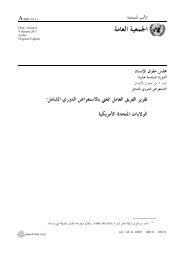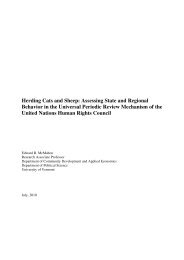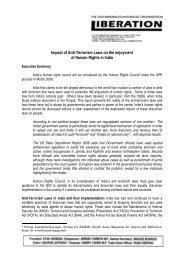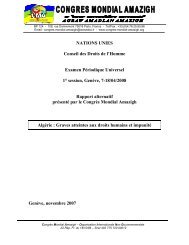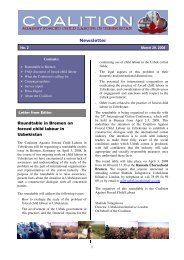Caste-based discrimination in India Joint NGO submission by the ...
Caste-based discrimination in India Joint NGO submission by the ...
Caste-based discrimination in India Joint NGO submission by the ...
You also want an ePaper? Increase the reach of your titles
YUMPU automatically turns print PDFs into web optimized ePapers that Google loves.
<strong>Caste</strong>-<strong>based</strong> <strong>discrim<strong>in</strong>ation</strong> <strong>in</strong> <strong>India</strong><br />
Jo<strong>in</strong>t <strong>NGO</strong> <strong>submission</strong> <strong>by</strong> <strong>the</strong> International Movement aga<strong>in</strong>st All<br />
Forms of Discrim<strong>in</strong>ation and Racism (IMADR) and <strong>the</strong> Lu<strong>the</strong>ran<br />
World Federation (LWF) <strong>in</strong> association with <strong>the</strong> National Campaign<br />
on Dalit Human Rights (NCDHR) and <strong>the</strong> International Dalit Solidarity<br />
Network (IDSN)<br />
related to <strong>India</strong> for first Universal Periodic Review session<br />
scheduled for April 2008<br />
Members and associates of <strong>the</strong> International Dalit Solidarity Network<br />
National Advocacy Platforms (South Asia):<br />
The National Campaign on Dalit Human Rights – <strong>India</strong><br />
The Dalit <strong>NGO</strong> Federation – Nepal<br />
The Human Development Organisation – Sri Lanka<br />
Dalit Solidarity Networks (Europe and USA):<br />
The Dalit Solidarity Network – UK<br />
The Dalit Solidarity Platform – Germany<br />
The Dalit Network – Ne<strong>the</strong>rlands<br />
The Dalit Solidarity Network – Denmark<br />
The Dalit Solidarity Network – Sweden<br />
The French Dalit Collectif – France<br />
The Dalit Solidarity Forum – USA<br />
Dalit Solidarity Platform - Belgium<br />
International associates:<br />
Human Rights Watch<br />
The International Movement Aga<strong>in</strong>st all Forms of Discrim<strong>in</strong>ation<br />
and Racism<br />
The Lu<strong>the</strong>ran World Federation<br />
Anti-Slavery International<br />
The M<strong>in</strong>ority Rights Group International<br />
The Asian Human Rights Commission<br />
The Robert F. Kennedy Foundation<br />
ICMICA/Pax Romana<br />
FORUM-ASIA<br />
The World Council of Churches<br />
The Commonwealth Human Rights Initiative<br />
Franciscans International<br />
Centre for Human Rights & Global Justice
Jo<strong>in</strong>t <strong>NGO</strong> <strong>submission</strong> <strong>by</strong> IMADR, LWF, NCDHR and IDSN on<br />
caste-<strong>based</strong> <strong>discrim<strong>in</strong>ation</strong> <strong>in</strong> <strong>India</strong> for <strong>the</strong> UPR session <strong>in</strong> 2008<br />
Introduction<br />
This jo<strong>in</strong>t <strong>NGO</strong> report submitted <strong>by</strong> <strong>the</strong> International Movement aga<strong>in</strong>st All Forms of Discrim<strong>in</strong>ation and<br />
Racism (IMADR) and <strong>the</strong> Lu<strong>the</strong>ran World Federation (LWF) 1 <strong>in</strong> association with <strong>the</strong> National Campaign<br />
on Dalit Human Rights (NCDHR) 2 and <strong>the</strong> International Dalit Solidarity Network (IDSN) 3 focuses<br />
specifically on caste-<strong>based</strong> <strong>discrim<strong>in</strong>ation</strong> related to <strong>the</strong> Government of <strong>India</strong>’s implementation of its<br />
national and <strong>in</strong>ternational obligations to protect and promote <strong>the</strong> human rights of approximately 167<br />
million Dalits <strong>in</strong> <strong>India</strong>. 4 In UN term<strong>in</strong>ology, this form of <strong>discrim<strong>in</strong>ation</strong> is known as “<strong>discrim<strong>in</strong>ation</strong> <strong>based</strong><br />
on work and descent.” 5 This report is <strong>based</strong> on <strong>the</strong> shadow reports submitted to CERD <strong>in</strong> February<br />
2007, o<strong>the</strong>r human rights reports, recommendations <strong>by</strong> UN treaty bodies, and resolutions <strong>by</strong> relevant UN<br />
bodies. 6 The <strong>submission</strong> follows <strong>the</strong> suggested guidel<strong>in</strong>es for “relevant stakeholders” wish<strong>in</strong>g to provide<br />
<strong>in</strong>formation to <strong>the</strong> Universal Periodic Review prepared <strong>by</strong> <strong>the</strong> OHCHR.<br />
1. National consultations <strong>in</strong> <strong>India</strong> with civil society<br />
The government authorities of <strong>India</strong> have not <strong>in</strong>vited civil society to participate <strong>in</strong> any broad national<br />
consultation as o<strong>the</strong>rwise suggested <strong>in</strong> <strong>the</strong> General Guidel<strong>in</strong>es for <strong>the</strong> preparation of <strong>in</strong>formation under<br />
<strong>the</strong> UPR.<br />
2. <strong>India</strong>’s normative and <strong>in</strong>stitutional framework for <strong>the</strong> promotion and protection of human<br />
rights<br />
The Constitution of <strong>India</strong> provides for <strong>the</strong> protection and promotion of <strong>the</strong> social, economic, educational,<br />
cultural and political rights of Dalits (termed ‘Scheduled <strong>Caste</strong>s’ <strong>in</strong> <strong>India</strong>). The Constitution emphasizes<br />
‘safe-guards’ for Scheduled <strong>Caste</strong>s (SCs) under <strong>the</strong> ‘Special Provisions Relat<strong>in</strong>g to Certa<strong>in</strong> Classes’ <strong>in</strong> Part<br />
XVI of <strong>the</strong> <strong>India</strong>n Constitution. In addition, many articles <strong>in</strong> Part III (Fundamental Rights), IV (Directive<br />
Pr<strong>in</strong>ciples of State Policy), IX, IX A and <strong>in</strong> <strong>the</strong> fifth schedule <strong>in</strong>clude constitutional provisions for Scheduled<br />
<strong>Caste</strong>s. 7 Although <strong>the</strong> Constitution of <strong>India</strong> prohibits any forms of <strong>discrim<strong>in</strong>ation</strong> <strong>based</strong> on caste, <strong>the</strong><br />
problem is <strong>the</strong> non-implementation of <strong>the</strong>se provisions as expla<strong>in</strong>ed below.<br />
3. Implementation of <strong>India</strong>’s national and <strong>in</strong>ternational human rights obligations and<br />
commitments<br />
The 1950 <strong>India</strong>n Constitution abolished <strong>the</strong> practice of “untouchability” <strong>in</strong> all its forms, and a number of<br />
laws and special measures have s<strong>in</strong>ce been adopted to address caste <strong>discrim<strong>in</strong>ation</strong> and abuses. While<br />
<strong>the</strong>se laws and policies are welcome, <strong>the</strong>y have been implemented sporadically and often not at all.<br />
Although <strong>the</strong> <strong>India</strong>n Constitution provides legal measures to advance <strong>the</strong> enjoyment of rights <strong>by</strong><br />
members of scheduled castes and scheduled tribes (SC/ST), <strong>the</strong> Dalits of <strong>India</strong> still suffer various forms<br />
of de facto segregation and <strong>discrim<strong>in</strong>ation</strong>. 8 Accord<strong>in</strong>g to a report prepared <strong>by</strong> <strong>the</strong> National Commission of<br />
Scheduled <strong>Caste</strong>s and Scheduled Tribes <strong>in</strong> <strong>India</strong>, <strong>the</strong> Protection of Civil Rights Act 1955, <strong>the</strong> <strong>India</strong>n Penal<br />
Code and <strong>the</strong> Scheduled <strong>Caste</strong>s and <strong>the</strong> Scheduled Tribes (Prevention of Atrocities) Act 1989 have proved<br />
<strong>in</strong>adequate <strong>in</strong> curb<strong>in</strong>g <strong>the</strong> atrocities on <strong>the</strong> members of Scheduled <strong>Caste</strong>s (SCs) and Scheduled Tribes<br />
(STs) <strong>in</strong> spite of <strong>the</strong>ir deterrent penal provisions, especially offences committed on <strong>the</strong> grounds of caste. 9<br />
There are <strong>in</strong> all 23 acts which constitute atrocities and are punishable under <strong>the</strong> Prevention of Atrocities Act<br />
1 Both IMADR and LWF have ECOSOC consultative status and <strong>the</strong> organisations are <strong>in</strong>ternational associates of IDSN.<br />
2 NCDHR is a national advocacy platform led <strong>by</strong> Dalit human rights activists with support from a range of movements, organisations and<br />
<strong>in</strong>dividuals to protect and promote <strong>the</strong> human rights of Dalits <strong>in</strong> <strong>India</strong>.<br />
3 IDSN is an <strong>in</strong>ternational lob<strong>by</strong> and advocacy network work<strong>in</strong>g for <strong>the</strong> elim<strong>in</strong>ation of caste-<strong>based</strong> <strong>discrim<strong>in</strong>ation</strong> globally.<br />
4 See Annex 2 for an explanatory note on <strong>the</strong> population of Dalits <strong>in</strong> <strong>India</strong> under “Who are Dalits” (p. 1)<br />
5 As recognised <strong>by</strong> <strong>the</strong> Commission on Human Rights <strong>in</strong> resolution 2005/109 and <strong>the</strong> Sub-Commission on <strong>the</strong> Promotion and Protection of<br />
Human Rights <strong>in</strong> resolution 2004/17, 2005/22 and 2006/14.<br />
6 See Annex 1 for a list of references<br />
7 See Annex 2 for a comprehensive list of constitutional safeguards accord<strong>in</strong>g to sectors (pp. 6-7)<br />
8 “Hidden Apar<strong>the</strong>id”, CERD shadow report (2007) prepared <strong>by</strong> Human Rights Watch and <strong>the</strong> Centre for Global Justice and Human Rights<br />
(CHRGJ)<br />
9 Report, National Commission for SC and ST, Government of <strong>India</strong>, New Delhi, 1999-2000 & 2000-2001, p. 207<br />
2
(henceforth POA Act) 10 It is <strong>the</strong> responsibility of <strong>the</strong> Central Government to place annual reports before <strong>the</strong><br />
Parliament on <strong>the</strong> progress of <strong>the</strong> implementation of <strong>the</strong> POA Act. However, even though <strong>the</strong> POA Act<br />
came <strong>in</strong>to force on 30th January 1990, <strong>the</strong> M<strong>in</strong>istry of Social Justice and Empowerment have placed only<br />
five annual reports on <strong>the</strong> table of Parliament so far. 11<br />
Despite <strong>India</strong>’s <strong>in</strong>ternational legal obligations to protect Dalit human rights, <strong>the</strong> Government of <strong>India</strong> has<br />
failed to enforce exist<strong>in</strong>g anti-<strong>discrim<strong>in</strong>ation</strong> measures and affirmative action legislation to live up to<br />
<strong>the</strong>se obligations. 12 Several UN human rights treaty bodies, <strong>in</strong> particular CERD and CEDAW, have<br />
repeatedly urged <strong>the</strong> Government of <strong>India</strong> to implement <strong>the</strong> serious concerns raised <strong>in</strong> <strong>the</strong>ir conclud<strong>in</strong>g<br />
observations and to ensure full implementation of <strong>the</strong>se <strong>in</strong>ternational treaty obligations at domestic<br />
level. 13 In 1996 CERD made its first reference to caste <strong>discrim<strong>in</strong>ation</strong> stat<strong>in</strong>g that <strong>the</strong> term ‘descent’<br />
mentioned <strong>in</strong> article 1 of <strong>the</strong> Convention does not solely refer to race but also to caste and analogous<br />
systems of <strong>in</strong>herited status. In CERD General Recommendation No. XXIX <strong>the</strong> Committee affirmed that<br />
<strong>the</strong> situation of Dalits fall with<strong>in</strong> <strong>the</strong> scope of ‘descent-<strong>based</strong> <strong>discrim<strong>in</strong>ation</strong>’ <strong>in</strong> <strong>the</strong> Convention. 14 The<br />
Government of <strong>India</strong> has, however, consistently failed to effectively implement its obligations under<br />
<strong>in</strong>ternational law to promote and protect Dalit human rights and <strong>in</strong> some cases avoided <strong>the</strong> question of<br />
caste <strong>discrim<strong>in</strong>ation</strong> argu<strong>in</strong>g that it does not fall under <strong>the</strong> scope of <strong>the</strong> <strong>in</strong>ternational conventions, such as<br />
<strong>the</strong> ICERD. 15<br />
The follow<strong>in</strong>g summarizes <strong>the</strong> concerns raised <strong>in</strong> previous UN treaty body recommendations and CERD<br />
General Recommendation no. XXIX related to <strong>the</strong> non-implementation of domestic legal obligations:<br />
- Despite <strong>the</strong> formal abolition of “Untouchability” <strong>by</strong> article 17 of <strong>the</strong> <strong>India</strong>n Constitution, de facto<br />
abolition segregation of Dalits persists, <strong>in</strong> particular <strong>in</strong> rural areas, <strong>in</strong> access to places of worship,<br />
hous<strong>in</strong>g, hospitals, education, water sources, markets and o<strong>the</strong>r public places which <strong>in</strong>cludes<br />
burial grounds and o<strong>the</strong>r common property resources <strong>in</strong> <strong>the</strong> villages. 16<br />
- <strong>India</strong> should provide effective protection to Dalits aga<strong>in</strong>st acts of <strong>discrim<strong>in</strong>ation</strong> and violence to<br />
prevent acts of arbitrary arrests, degrad<strong>in</strong>g and <strong>in</strong>human treatment and torture and extrajudicial<br />
kill<strong>in</strong>gs of Dalits. 17<br />
- While de jure equality has been realised <strong>in</strong> many spheres, de facto equality rema<strong>in</strong>s limited at<br />
domestic level for women <strong>in</strong> particular. <strong>India</strong> should develop a coord<strong>in</strong>ated and comprehensive<br />
plan to prosecute and punish perpetrators of acts of sexual violence of women and ensure that<br />
Dalit women have access to adequate and affordable justice delivery mechanism, land, labour,<br />
education, health, hous<strong>in</strong>g etc. 18<br />
- <strong>India</strong> should effectively enforce <strong>the</strong> reservation policies <strong>in</strong> <strong>the</strong> public sector and also evolve a<br />
positive <strong>discrim<strong>in</strong>ation</strong> policy to be followed <strong>by</strong> <strong>the</strong> private sector. 19<br />
- <strong>India</strong> should <strong>in</strong>vestigate alleged cases <strong>in</strong> denial of access to relief and rehabilitation measures of<br />
<strong>the</strong> Government immediately after any natural disasters like <strong>the</strong> Tsunami, cyclone, earth and<br />
fire. 20<br />
- Effective measures should be taken to ensure that Dalits who are victims of acts of violence and<br />
<strong>discrim<strong>in</strong>ation</strong> have access to effective remedies and to ensure that compla<strong>in</strong>ts are registered<br />
under <strong>the</strong> POA Act 1989 and o<strong>the</strong>r crim<strong>in</strong>al law provisions are ensured through <strong>in</strong>vestigation,<br />
arrest of perpetrators, prosecution, conviction, and victims compensated and rehabilitated. 21<br />
- <strong>India</strong> should provide statistics and analysis <strong>based</strong> on disaggregated data on caste, gender, tribe<br />
and ethnicity to UN treaty bodies. 22<br />
Recommendation no. 1<br />
- The Government of <strong>India</strong> should enforce and effectively monitor its legal provisions at domestic<br />
level to prevent atrocities aga<strong>in</strong>st Dalits <strong>in</strong> support of recommendations previously issued <strong>by</strong> UN<br />
10 Ibid. pp. 207-209<br />
11 Annual Report on POA 2005 <strong>by</strong> Government of <strong>India</strong>, http://socialjustice.nic.<strong>in</strong>/schedule/arpoa05.pdf<br />
12 For an overview of <strong>India</strong>’s <strong>in</strong>ternational obligations, see “Hidden Apar<strong>the</strong>id” p. 2<br />
13 In particular CERD Conclud<strong>in</strong>g Observation February 2007 and CEDAW Conclud<strong>in</strong>g Observation January 2007<br />
14 CERD General Recommendation no. XXIX<br />
15 As it was <strong>the</strong> case dur<strong>in</strong>g <strong>the</strong> last exam<strong>in</strong>ation of <strong>India</strong> <strong>by</strong> CERD <strong>in</strong> February 2007<br />
16 CERD (2007) Conclud<strong>in</strong>g Observation no. 13 and CERD General Recommendation no. XXIX “General measures”<br />
17 CERD (2007) Conclud<strong>in</strong>g Observation no. 14<br />
18 CEDAW (2007) Conclud<strong>in</strong>g Comment no. 12 and 21 and CERD (2007) Conclud<strong>in</strong>g Observation no. 15 and CERD General Recommendation<br />
no. XXIX “Multiple <strong>discrim<strong>in</strong>ation</strong> aga<strong>in</strong>st women”<br />
19 CERD (2007) Conclud<strong>in</strong>g Observation no. 17<br />
20 CERD (2007) Conclud<strong>in</strong>g Observation no. 22<br />
21 CERD (2007) Conclud<strong>in</strong>g Observation no. 20<br />
22 CEDAW (2007) Conclud<strong>in</strong>g Comment no. 15 and CERD (2007) Conclud<strong>in</strong>g Observation no. 9<br />
3
treaty bodies; implement <strong>the</strong> general measures conta<strong>in</strong>ed <strong>in</strong> CERD General Recommendation<br />
no. XXIX <strong>in</strong> its National Policy Framework of Governance; and follow <strong>the</strong> recommendations<br />
issued <strong>by</strong> national human rights <strong>in</strong>stitutions document<strong>in</strong>g consistent patterns of gross human<br />
rights violations aga<strong>in</strong>st Dalits <strong>in</strong> <strong>India</strong>.<br />
4. International and national cooperation with human rights mechanisms <strong>in</strong> <strong>India</strong><br />
With <strong>the</strong> National Human Rights Commission (NHRC) as an apex human rights <strong>in</strong>stitution <strong>in</strong> <strong>India</strong>, <strong>the</strong>re<br />
has been efforts for <strong>in</strong>clusion of <strong>the</strong> civil society through an <strong>in</strong>stitutionalized <strong>NGO</strong> Coord<strong>in</strong>ation<br />
Committee at national level. In a comprehensive report on <strong>the</strong> Prevention of Atrocities aga<strong>in</strong>st SCs and<br />
STs prepared <strong>by</strong> <strong>the</strong> NHRC, <strong>the</strong> <strong>in</strong>stitution makes 150 recommendations on how to enhance <strong>the</strong><br />
implementation of provisions to prevent <strong>discrim<strong>in</strong>ation</strong> aga<strong>in</strong>st such groups. 23 However, many of <strong>the</strong><br />
recommendations produced <strong>by</strong> <strong>the</strong> NHRC have not been followed <strong>by</strong> <strong>the</strong> Government of <strong>India</strong>. The<br />
constitutional mandate of <strong>the</strong> National Commission for Scheduled <strong>Caste</strong>s and Scheduled Tribes and <strong>the</strong><br />
National Commission for Women and o<strong>the</strong>r commissions should be expanded to ensure that <strong>the</strong>ir<br />
recommendations become b<strong>in</strong>d<strong>in</strong>g on union or state governments, public sector units and f<strong>in</strong>ancial<br />
<strong>in</strong>stitutions. Moreover, <strong>the</strong> <strong>in</strong>stitutions should have powers to undertake corrective measures, <strong>in</strong>clud<strong>in</strong>g<br />
action tak<strong>in</strong>g on err<strong>in</strong>g officials is vested <strong>in</strong> <strong>the</strong>m 24 ; <strong>in</strong>corporate analysis of caste <strong>discrim<strong>in</strong>ation</strong> and<br />
disabilities with regards to women; and take necessary additional steps to support Dalit women and<br />
communities <strong>in</strong> ensur<strong>in</strong>g and access<strong>in</strong>g <strong>the</strong>ir rights and entitlements.<br />
At <strong>in</strong>ternational level, <strong>the</strong> Government of <strong>India</strong> has systematically failed to cooperate effectively with <strong>the</strong><br />
UN Special Procedures <strong>in</strong> any consistent manner. The UN Special Rapporteur on Contemporary Forms<br />
of Discrim<strong>in</strong>ation, Mr. Diène has extended his request to visit <strong>India</strong> several times, but <strong>the</strong> <strong>in</strong>vitation has<br />
not yet been accepted <strong>by</strong> <strong>the</strong> Government. 25 Moreover, <strong>the</strong> Government of <strong>India</strong> has not responded to<br />
<strong>the</strong> request for <strong>the</strong> cooperation and <strong>submission</strong> of <strong>in</strong>formation <strong>in</strong> <strong>the</strong> form of questionnaires to <strong>the</strong><br />
Special Rapporteurs from <strong>the</strong> Sub-Commission conduct<strong>in</strong>g a comprehensive study on <strong>discrim<strong>in</strong>ation</strong><br />
<strong>based</strong> on work and descent. 26<br />
Recommendation no. 2<br />
- At national level <strong>the</strong> Government of <strong>India</strong> should follow up on <strong>the</strong> exist<strong>in</strong>g recommendations<br />
presented <strong>by</strong> national human rights commissions and expand <strong>the</strong> constitutional mandate to ensure<br />
that <strong>the</strong> recommendations are implemented.<br />
- At <strong>in</strong>ternational level <strong>the</strong> Government of <strong>India</strong> should fully cooperate with UN human rights bodies, <strong>in</strong><br />
particular <strong>the</strong> Special Rapporteurs and extend <strong>in</strong>vitations for country visits.<br />
5. Achievements, best practices, challenges and constra<strong>in</strong>ts <strong>in</strong> elim<strong>in</strong>at<strong>in</strong>g caste<br />
<strong>discrim<strong>in</strong>ation</strong> <strong>in</strong> <strong>India</strong><br />
Achievements and best practices: The statement made <strong>by</strong> <strong>India</strong>n Prime M<strong>in</strong>ister Dr. Manmohan S<strong>in</strong>gh<br />
at an <strong>in</strong>ternational conference <strong>in</strong> December 2006 <strong>in</strong> which he compared <strong>the</strong> untouchability practice <strong>in</strong> <strong>India</strong><br />
to apar<strong>the</strong>id <strong>in</strong> South Africa was a milestone <strong>in</strong> <strong>the</strong> recognition of <strong>the</strong> social <strong>discrim<strong>in</strong>ation</strong> aga<strong>in</strong>st Dalits <strong>in</strong><br />
many parts of <strong>India</strong> 27 . The Prime M<strong>in</strong>ister said that caste <strong>in</strong>justices was “modern <strong>India</strong>’s failure that millions<br />
of Dalits were still fight<strong>in</strong>g prejudice” and that Dalits “faced a unique <strong>discrim<strong>in</strong>ation</strong> <strong>in</strong> our society that is<br />
fundamentally different from <strong>the</strong> problems of m<strong>in</strong>ority groups <strong>in</strong> general." This public statement, recognis<strong>in</strong>g<br />
<strong>the</strong> de facto <strong>discrim<strong>in</strong>ation</strong> aga<strong>in</strong>st Dalits <strong>in</strong> <strong>India</strong>, should be followed up <strong>by</strong> effective measures at national<br />
level to implement <strong>the</strong> constitutional safe-guards protect<strong>in</strong>g Dalits from <strong>discrim<strong>in</strong>ation</strong>. The exist<strong>in</strong>g<br />
constitutional provisions, special legislation and affirmative actions programmes have provided some<br />
space and confidence for Dalits and have made <strong>the</strong>m more assertive of <strong>the</strong>ir rights. Some of <strong>the</strong> positive<br />
ga<strong>in</strong>s of <strong>the</strong> affirmative action policy has resulted <strong>in</strong> <strong>the</strong> fact that a small percentage of Dalits have<br />
become literate and reservation policies <strong>in</strong> public service have secured employment for some Dalits. The<br />
23 NHRC “Report on Prevention of Atrocities Aga<strong>in</strong>st SCs and STs”<br />
24 The National Commission for SC/ST has made <strong>the</strong>se recommendations <strong>in</strong> <strong>the</strong>ir many reports to <strong>the</strong> government. See o<strong>the</strong>r recommendations<br />
<strong>in</strong> Annex 2 “National Commissions” (p. 9)<br />
25 Annual Report 2006 (E/CN.4/2006/16) (p. 5)<br />
26 For references to <strong>the</strong> UN study on <strong>discrim<strong>in</strong>ation</strong> <strong>based</strong> on work and descent, see <strong>the</strong> footnote above<br />
27 The Guardian, UK, 28 December 2006 – report<strong>in</strong>g <strong>the</strong> Prime M<strong>in</strong>ister of <strong>India</strong>’s <strong>in</strong>augural address on <strong>the</strong> occasion<br />
of <strong>the</strong> International Conference on Dalits and M<strong>in</strong>orities <strong>in</strong> New Delhi, 27-28 December, 2006.<br />
4
eservation policies have also allowed for greater political participation of Dalits <strong>in</strong> <strong>the</strong> parliament and<br />
national assemblies, however <strong>the</strong> <strong>in</strong>clusion of Dalits <strong>in</strong> social, economic, political spheres is still<br />
<strong>in</strong>adequate. 28<br />
Constra<strong>in</strong>ts: Exist<strong>in</strong>g legislation and special measures protect<strong>in</strong>g <strong>the</strong> rights of Dalits needs to be<br />
effectively implemented and monitored. Moreover, <strong>the</strong> non-availability of disaggregated data on some<br />
areas of <strong>the</strong> caste-<strong>based</strong> <strong>discrim<strong>in</strong>ation</strong> prevents <strong>in</strong>-depth analysis and targeted plann<strong>in</strong>g which may<br />
contribute to <strong>discrim<strong>in</strong>ation</strong> aga<strong>in</strong>st Dalits <strong>in</strong> <strong>the</strong> right to land, hous<strong>in</strong>g, health, education and<br />
employment. The cont<strong>in</strong>ued implementation gap result <strong>in</strong> non-sensitized attitude aga<strong>in</strong>st Dalits <strong>in</strong> <strong>the</strong><br />
media, among public officials and <strong>the</strong> judiciary. It also amounts to alienation <strong>in</strong> <strong>the</strong> market doma<strong>in</strong> and<br />
access to resources which effectively contributes to <strong>the</strong> prevalence of bonded and child labour. 29 30 The<br />
lack of expanded constitutional mandates of <strong>the</strong> national human rights commissions only adds up to <strong>the</strong><br />
ris<strong>in</strong>g disparities <strong>in</strong> address<strong>in</strong>g <strong>the</strong> challenges of caste-<strong>based</strong> <strong>discrim<strong>in</strong>ation</strong>. There is a repeated denial<br />
of caste <strong>based</strong> <strong>discrim<strong>in</strong>ation</strong> ak<strong>in</strong> to racial <strong>discrim<strong>in</strong>ation</strong> at <strong>the</strong> UN CERD, CEDAW and o<strong>the</strong>r bodies<br />
while measures are be<strong>in</strong>g taken <strong>in</strong> <strong>the</strong> country to address this aspect. This restricts <strong>the</strong> UN procedures<br />
and resources to support <strong>the</strong> national measures to make <strong>the</strong>m more effective.<br />
Challenges: Severe violations persist <strong>in</strong> access to education, health, hous<strong>in</strong>g, and property, and<br />
freedom of religion, free choice of employment, and equal treatment before <strong>the</strong> law as established <strong>by</strong> UN<br />
treaty bodies and documented <strong>in</strong> human rights reports. 31 Ano<strong>the</strong>r challenge is that Dalits are often<br />
restricted <strong>by</strong> poverty as <strong>the</strong>y are some of <strong>the</strong> most marg<strong>in</strong>alized groups economically and socially <strong>in</strong><br />
<strong>India</strong>. 32 The Government of <strong>India</strong> should <strong>the</strong>refore ensure that Dalits <strong>in</strong> <strong>India</strong>, especially Dalit Women,<br />
also are able to reach <strong>the</strong> Millennium Development Goals (MDGs) adopted <strong>by</strong> <strong>the</strong> UN General<br />
Assembly.<br />
6. Key national priorities to improve <strong>the</strong> human rights situation of Dalits <strong>in</strong> <strong>India</strong><br />
The key national priorities to improve <strong>the</strong> situation of Dalits <strong>in</strong> <strong>India</strong> should seek guidance from <strong>the</strong><br />
<strong>in</strong>ternational framework established <strong>in</strong> <strong>the</strong> draft UN pr<strong>in</strong>ciples and guidel<strong>in</strong>es on <strong>discrim<strong>in</strong>ation</strong> <strong>based</strong> on<br />
work and descent (hereafter ‘draft P&G’) prepared <strong>by</strong> two Special Rapporteurs from <strong>the</strong> Sub-<br />
Commission on <strong>the</strong> Promotion and Protection of Human Rights s<strong>in</strong>ce 2004. 33 The draft P&G serve as a<br />
guid<strong>in</strong>g framework prescrib<strong>in</strong>g general and specific measures for <strong>the</strong> effective elim<strong>in</strong>ation of such form of<br />
<strong>discrim<strong>in</strong>ation</strong> <strong>by</strong> caste-affected governments and o<strong>the</strong>r relevant actors such as UN agencies, national<br />
human rights <strong>in</strong>stitutions and civil society. In UN term<strong>in</strong>ology <strong>discrim<strong>in</strong>ation</strong> <strong>based</strong> on work and descent<br />
is def<strong>in</strong>ed as “any dist<strong>in</strong>ction, exclusion, restriction, or preference <strong>based</strong> on <strong>in</strong>herited status such as<br />
caste […] that has <strong>the</strong> purpose or effect of nullify<strong>in</strong>g or impair<strong>in</strong>g <strong>the</strong> recognition, enjoyment, or exercise<br />
of human rights and fundamental freedoms <strong>in</strong> <strong>the</strong> political, economic, social, cultural, or any o<strong>the</strong>r field of<br />
public life. This type of <strong>discrim<strong>in</strong>ation</strong> is typically associated with <strong>the</strong> notion of purity and pollution and<br />
practices of “untouchability”, and is deeply rooted <strong>in</strong> societies and cultures where this <strong>discrim<strong>in</strong>ation</strong> is<br />
practiced”.<br />
The draft P&G underl<strong>in</strong>e that <strong>discrim<strong>in</strong>ation</strong> <strong>based</strong> on work and descent is a form of <strong>discrim<strong>in</strong>ation</strong><br />
prohibited <strong>by</strong> <strong>in</strong>ternational human rights law. 34 As an overarch<strong>in</strong>g pr<strong>in</strong>ciple <strong>the</strong> draft P&G establish that<br />
all states, <strong>in</strong>clud<strong>in</strong>g <strong>India</strong>, have a duty to make s<strong>in</strong>cere efforts to dispel <strong>the</strong> prejudicial beliefs that<br />
constitute, support and re<strong>in</strong>force <strong>discrim<strong>in</strong>ation</strong> <strong>based</strong> on work and descent, <strong>in</strong>clud<strong>in</strong>g notions of<br />
untouchability, pollution and caste superiority or <strong>in</strong>feriority, as well as to prevent actions taken on <strong>the</strong><br />
basis of such beliefs. The pr<strong>in</strong>ciples and guidel<strong>in</strong>es suggest <strong>the</strong> specific measures to be implemented for<br />
<strong>the</strong> effective elim<strong>in</strong>ation of this form of <strong>discrim<strong>in</strong>ation</strong>, <strong>in</strong>clud<strong>in</strong>g all necessary constitutional, legislative,<br />
adm<strong>in</strong>istrative, budgetary and judicial measures and appropriate forms of affirmative action and public<br />
education programmes to prevent, prohibit and provide redress for <strong>discrim<strong>in</strong>ation</strong> <strong>based</strong> on work and<br />
28 See Annex 2 (pp. 3-5) and NCDHR’s shadow report submitted to CERD<br />
29 See NCDHR’s shadow report prepared to CERD 2007 (l<strong>in</strong>k above)<br />
30 ILO Factsheet “Discrim<strong>in</strong>ation at Work <strong>in</strong> Asia”, Global Report 2007, p. 1<br />
31 See ”Hidden Apar<strong>the</strong>id” <strong>by</strong> Human Rights Watch and <strong>the</strong> Centre for Human Rights and Global Justice (l<strong>in</strong>k above)<br />
32 See Annex 2 ”Poverty” p. 5 and IDSN factsheet “<strong>Caste</strong> an Eye”<br />
33 The draft P&G have been submitted to <strong>the</strong> OHCHR as part of <strong>the</strong> f<strong>in</strong>al report prepared <strong>by</strong> <strong>the</strong> Special Rapporteurs but <strong>the</strong>y are not yet<br />
considered an official UN document as of November 2007. In <strong>the</strong> f<strong>in</strong>al report <strong>the</strong> Special Rapporteurs recommend <strong>the</strong> Human Rights Council to<br />
adopt <strong>the</strong> draft P&G with necessary amendments and submit <strong>the</strong>m to <strong>the</strong> General Assembly, and to <strong>in</strong>clude <strong>discrim<strong>in</strong>ation</strong> <strong>based</strong> on work and<br />
descent among <strong>the</strong> studies to be conducted <strong>by</strong> <strong>the</strong> Human Rights Council.<br />
34 As proclaimed <strong>by</strong> <strong>the</strong> Universal Declaration of Human Rights and, <strong>in</strong>ter alia, <strong>by</strong> <strong>the</strong> ICCPR, ICESCR, ICERD, ICEDAW, CRC and <strong>the</strong><br />
International Labour Organization Convention No. 111 and CERD General Recommendation no. XXIX.<br />
5
descent <strong>in</strong> both public and private spheres; and ensure that such measures are respected and<br />
implemented <strong>by</strong> all State authorities at all levels. 35<br />
Recommendation no. 3<br />
- The draft Pr<strong>in</strong>ciples and Guidel<strong>in</strong>es should serve as a guid<strong>in</strong>g framework for <strong>the</strong> consideration of<br />
effective measures to be taken <strong>by</strong> <strong>the</strong> Government of <strong>India</strong> <strong>in</strong> <strong>the</strong> fulfillment of its <strong>in</strong>ternational<br />
legal obligations.<br />
- Follow<strong>in</strong>g <strong>the</strong> Special Rapporteurs’ recommendations, states should endorse <strong>the</strong> UN Pr<strong>in</strong>ciples<br />
and Guidel<strong>in</strong>es for <strong>the</strong> Effective Elim<strong>in</strong>ation of Discrim<strong>in</strong>ation <strong>based</strong> on Work and Descent and<br />
<strong>in</strong>clude <strong>the</strong> topic of <strong>discrim<strong>in</strong>ation</strong> <strong>based</strong> on work and descent among <strong>the</strong> studies to be<br />
undertaken <strong>by</strong> <strong>the</strong> Council.<br />
7. Capacity-build<strong>in</strong>g and technical assistance through bilateral, regional and <strong>in</strong>ternational<br />
cooperation <strong>in</strong> <strong>India</strong><br />
The follow<strong>in</strong>g <strong>in</strong>itiatives should be taken to address <strong>the</strong> non-implementation of <strong>India</strong>’s national and<br />
<strong>in</strong>ternational legal obligations:<br />
- Technical support and assistance, <strong>in</strong>volv<strong>in</strong>g UN experts and <strong>in</strong>ternational <strong>in</strong>stitutions of expertise,<br />
to identify and remove barriers <strong>in</strong> <strong>the</strong> justice adm<strong>in</strong>istration system to tackle <strong>the</strong> persistent pattern<br />
of impunity for atrocities aga<strong>in</strong>st Dalits, <strong>in</strong>clud<strong>in</strong>g tra<strong>in</strong><strong>in</strong>g of police, judges, prosecutors and o<strong>the</strong>r<br />
personnel <strong>in</strong> <strong>the</strong> adm<strong>in</strong>istration of justice and enhancement of crim<strong>in</strong>al law measures aga<strong>in</strong>st law<br />
enforcement officers who violate <strong>the</strong>ir duty of protection <strong>in</strong> relation to crimes aga<strong>in</strong>st Dalits;<br />
- Technical support for address<strong>in</strong>g <strong>the</strong> pervasive problems of violence, harassment and sexual<br />
abuse aga<strong>in</strong>st Dalit women <strong>in</strong>clud<strong>in</strong>g effective measures to prosecute and punish perpetrators of<br />
acts of sexual violence and exploitation of Dalit women;<br />
- Technical and <strong>in</strong>stitutional support to establish<strong>in</strong>g transparent and accountable monitor<strong>in</strong>g<br />
mechanisms on <strong>the</strong> implementation of anti-<strong>discrim<strong>in</strong>ation</strong> and affirmative action legislation;<br />
- Technical and capacity build<strong>in</strong>g support to a nation-wide programmes address<strong>in</strong>g specific target<br />
groups as well as <strong>the</strong> public <strong>in</strong> general, sensitiz<strong>in</strong>g such groups towards abolish<strong>in</strong>g all forms of<br />
<strong>discrim<strong>in</strong>ation</strong> aga<strong>in</strong>st Dalits;<br />
- Technical support for <strong>the</strong> curriculum development and educational plann<strong>in</strong>g to reflect a full<br />
human rights’ perspective on caste <strong>discrim<strong>in</strong>ation</strong>, <strong>in</strong>clud<strong>in</strong>g <strong>in</strong> educational material and teach<strong>in</strong>g<br />
methodologies;<br />
- Technical support for develop<strong>in</strong>g a mechanism to correct <strong>the</strong> discrepancies <strong>in</strong> data collection <strong>by</strong><br />
several constitutional bodies and government agencies on <strong>the</strong> exact number of human rights<br />
violations on Dalits;<br />
- Technical support to review recommendations of <strong>the</strong> National Human Rights Commission<br />
conta<strong>in</strong>ed <strong>in</strong> its report on <strong>the</strong> Implementation of <strong>the</strong> Scheduled <strong>Caste</strong> and Scheduled Tribes<br />
(Prevention of Atrocities) Act 1989 and to set up plann<strong>in</strong>g and monitor<strong>in</strong>g mechanisms for <strong>the</strong>ir<br />
implementation;<br />
- Technical support for development of guidel<strong>in</strong>es for plann<strong>in</strong>g and implementation of development<br />
plann<strong>in</strong>g and budget<strong>in</strong>g with a view to secure full <strong>in</strong>clusion of Dalits (to implement <strong>the</strong>ir social,<br />
political and cultural rights); tak<strong>in</strong>g <strong>in</strong>to consideration <strong>the</strong> need for disaggregated data and caste<br />
sensitive analysis and for ma<strong>in</strong>stream<strong>in</strong>g and <strong>in</strong>clusion of Dalits <strong>in</strong> <strong>the</strong> development process as<br />
well as provision of and full implementation of special measures monitored aga<strong>in</strong>st specific time<br />
bound plans and benchmarks; and reflected <strong>in</strong> plann<strong>in</strong>g and report<strong>in</strong>g for Millennium<br />
Development Goals and o<strong>the</strong>r national plans for achievement of development goals across <strong>the</strong><br />
socio-economic and cultural rights spectrum.<br />
-----<br />
35 F<strong>in</strong>al report <strong>in</strong>clud<strong>in</strong>g draft P&G prepared <strong>by</strong> Special Rapporteurs Prof. Yokota and Prof. Chung pursuant to Sub-Commission resolution<br />
2006/14.<br />
6


